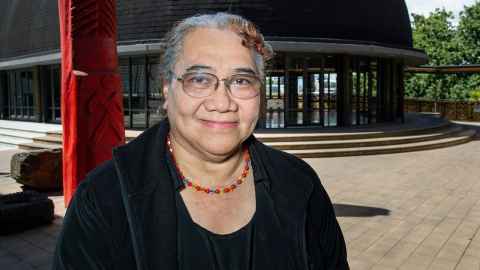Why Tongan has no word for human rights
8 April 2019
Opinion: Dr Melenaite Taumoefolau examines the gulf between modern and traditional Tongans and explains why the language has no term for human rights.

It strikes me that Tongan people are sharply divided into two camps by the English language and the global knowledge embodied in it. The first group is the minority English-speaking group. Knowledgeable of the ins and outs of today’s globalised world, they are ‘modernists’, educated, have been overseas and include many in government, the public service and the professions. It is they who push for democratic change and seek to ratify human rights treaties like CEDAW (the Convention for the Elimination of All Forms of Discriminations Against Women).
The other group, the majority of Tongans, are the ‘traditionalists’. Mainly Tongan-speaking, they have traditional beliefs in the society being made up of the king at the top, then the nobles or chiefs, then the commoners at the bottom. They speak little or no English, not enough to engage politically in modern ideas of government. They follow the advice of their religious and political leaders. For them, democracy is new and foreign, and their knowledge is largely gathered from hearing discussions on the radio, at kava parties, village weaving or ngatu-making gatherings, church or family gatherings.
The knowledge gulf between the two camps is huge, resulting in traditionalists not fully appreciating Western-derived concepts like human rights, which go beyond Tongan society to the universal human society. When the government announced its intention to have CEDAW ratified, more than 10,000 people petitioned the king that it was contrary to Tongan culture and religion. The king stopped the ratification.
Tongan people, a product of centuries of monarchy and social hierarchy, are never born free or equal, and Tongan has no word for ‘rights’ as in ‘to have rights’, nor a conventional way of saying that one has a voice in something.
In Tonga, indeed in much of Polynesia and the Pacific, human rights conflict with cultural ‘rights’, or the cultural roles, of Pacific peoples. Tongan people, a product of centuries of monarchy and social hierarchy, are never born free or equal, and Tongan has no word for ‘rights’ as in ‘to have rights’, nor a conventional way of saying that one has a voice in something.
Tongan language now has totonu (rights), totonu ‘a e tangatá (the rights of humans) and ‘i ai honau le‘o (they have a voice), but these have developed as literal translations of the English expressions. Tongan pro-democracy activists are devising translations for concepts such as ‘accountability’ and ‘transparency’ so they can talk about them in Tongan. But these are not yet fully understood by most Tongans.
So, in a nation trying to introduce human rights and democracy, a first obstacle is to have Tongan words for these ideals. It is quite common for people who talk about democracy and politics to code-switch to English because there are no conventionalised ways of talking about these ideas in Tongan. In fact, the traditionalists are not being deliberately traditionalist. In the Tongan cultural context it is simply the way to be, because the Tongan world-view, as reflected in the language, lacks such liberal ideals as democracy and human rights principles.
I sometimes wonder whether Tonga’s democracy includes homosexual people. There are no words in Tongan for the concepts homosexuality, gay, gender or sexual orientation, let alone concepts like bisexual and transsexual. These are concepts that Tongan people are exposed to only through the English language. They are not yet part of the traditional Tongan world-view.
In a nation trying to introduce human rights and democracy, a first obstacle is to have Tongan words for these ideals.
Even considerations of the rights of women, who make up half of the Tongan population, may not yet be part of Tonga’s democracy. In the Tongan world-view, women and men have complementary collaborative roles which they adhere to in order to run the family. Men (fathers, husbands) rule and head the family; it is they who make the really important decisions. Women (wives, mothers) take care of children and run the domestic sphere of day-to-day life. So men and women are necessarily unlike and unequal, but their roles fit together to complete the holistic scheme of running the family.
Politically then, men have more power than women. This seems contrary to human rights, which says that men and women should have equal rights, hence CEDAW. As for children, their role in the family is to obey what they are told. Because children only do what they are told in Tongan culture, they have very few, if any, cultural rights, let alone any political influence in the family. Yet the United Nations has a document outlining the Rights of the Child. These are the human rights of children.
On Friday March 15 I was judging at the Polyfest Tongan Stage when the final day was cancelled in case of any risks to our children performers and their families, and to show solidarity with the Muslim community in their loss, which is also our New Zealand loss, our human loss.
It brought home sharply what human rights are – the right to be free of all forms of discrimination and racial and religious violence. If Tongans can see that, then they will see it is ok to meet human rights half-way. Because, as poet John Donne wrote, “... never send to know for whom the bell tolls – it tolls for thee”.
Read more: Tongans walking in the democratic dark
Dr Melenaite Taumoefolau is Tongan and a senior lecturer at the Centre for Pacific Studies, Te Wānanga o Waipapa in the Faculty of Arts. This article reflects the opinion of the author and not necessarily the views of the University of Auckland.
Used with permission from Newsroom Why Tongan has no word for human rights published on 8 April 2019.